Stephen Roney's Blog, page 265
January 4, 2020
Death from the Baghdad Skies
Much excitement about America’s air strike that killed Iranian general Soleimani. While some applaud Trump for his decisiveness, many are talking about him risking “World War 3.” The emotions are high. A recent Fox News panel devolved into a shouting match.
Time and future Iranian actions will tell, but from my knowledge of Islam and the Middle East, I think this dramatic response to the Baghdad embassy siege was the right approach.
There is something the Christian West seems generally incapable of understanding about the Muslim world. Jesus’s advice to “turn the other check” and respond to anger with love is peculiarly Christian. Islam’s prophet was an emperor and conqueror. Accordingly, if an adversary responds meekly and with moderation, that does not, in the Muslim mind, give them any moral authority. It is not going to inspire the Muslim to do likewise.
Instead, it looks like either an admission of weakness, or an admission that they, the adversary, are in the moral wrong.
God is on the side of the big battalions; the big battalions are on the side of God.
Responding mildly is the path more likely to lead to more and stronger attacks.
The same dynamic explains why the Middle East seems to require authoritarian governments, and their removal in several countries over the “Arab Spring,” and by the US in Iraq, has only led to chaos. A more relaxed and moderate approach will impress no one; it is an admission of immorality or incapacity. Moderation in the defense of virtue, after all, is no virtue; extremism in opposition to vice is no vice.
I expect the strike at Baghdad airport to cause the Iranian regime to pull in their horns.
If it does not, if they do not, if this escalates, the big loser will be Joe Biden. The big winners will be Bernie Sanders and Tulsi Gabbard. Gabbard has positioned herself as the peace candidate; this gives her relevance. Biden is vulnerable for having supported the Iraq War—he is no peace candidate. The war vote, conversely, automatically coalesces around the Commander-in-Chief.
Meanwhile, in Iran, the mullahs are already in trouble domestically for their adventurism abroad. It is suicidal for them to escalate this. They cannot afford it. If, on the other hand, they respond meekly, they face the same problem: it is an admission of either incapacity or moral fault. Trump has them over a barrel.
'Od's Blog: Catholic and Clear Grit comments on the passing parade.
Published on January 04, 2020 06:49
January 3, 2020
A McGarrigle Christmas
'Od's Blog: Catholic and Clear Grit comments on the passing parade.
Published on January 03, 2020 15:28
The New Anglosphere: A Prediction
Brexit is going to be awkward for Ireland.
We’ve fussed about a hard border with Northern Ireland, but I’m not sure we have yet realized the real implications. For reasons of geography and shared history and culture, Irish foreign trade is naturally overwhelmingly with the UK; the UK out of the union, and Ireland in, does not work for the Irish economy.
The obvious solution is not keeping Northern Ireland within the European customs union, but taking Ireland out.
But it is also intolerable to Ireland to be thus dominated by England alone. Belonging to the bigger club was important in that regard.
This, it seems to me, is one more argument for a big new customs union of the English-speaking democracies. A union that included the US, Canada, Australia and New Zealand along with the UK and Ireland would protect the latter from British domination; and seems natural since so much of the populations of the other members are ethnically Irish. Form a union including Australia, the US, and Canada, and it seems strange for Ireland not to be a part. They are part of the same ethnic family, with much shared history.
Such a union would also benefit the UK by reducing the risks of Scottish independence disrupting the economy. Scotland could, if it chose, become independent of the UK, while still remaining in the larger union, and the economic effects would be minimal. And Scotland will feel, like Ireland, less concerned with English domination within a larger union. Reducing any temptation to split in order to remain in the EU. As with Ireland, Scottish trade is inevitably overwhelmingly with England in any case, not with continental Europe.
The logic of it all is strong enough that I think it is likely to happen. It is all very much in the UK’s interest, and Ireland’s interest, in compensation for the loss of easy access to European markets. It is in Ireland’s and Scotland’s interest to counterbalance domination by England. It is in Canada’s interest, to counterbalance domination by the US. It is in New Zealand’s interest, to counterbalance domination by Australia. If it included a military union, it would be in Australia’s interest for security against an increasingly expansionist China.
And it seems to me it is also in America’s interest, in expanding their sphere of influence. They will naturally dominate the union. And they too might want the increased military and economic power to counter an expansionist China.
An additional attraction for Canadians would be the ability for snowbirds to migrate south more easily. For the same reason, the union might welcome in Malta or Greek Cyprus, both of whom have historic ties. This would preserve a similar snowbird option for Brits, with their loss of easy access to Spain, and benefit these economies.
I predict the idea is likely to pick up steam soon, as the realities of Britain’s exit from the EU become clear.
'Od's Blog: Catholic and Clear Grit comments on the passing parade.
Published on January 03, 2020 06:39
A Rant on Irreproducible Science
Published on January 03, 2020 03:56
January 2, 2020
Classically Christmas
'Od's Blog: Catholic and Clear Grit comments on the passing parade.
Published on January 02, 2020 07:37
The Truth about the RCMP
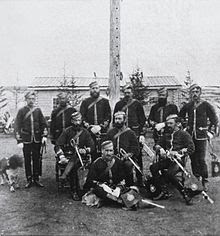 NWMP constables, Ft. Walsh, 1878.Sadly, like everything else in our history deserving of honour, the Mounties have recently been the victim of some revisionist history.
NWMP constables, Ft. Walsh, 1878.Sadly, like everything else in our history deserving of honour, the Mounties have recently been the victim of some revisionist history. Steve Hewitt, history lecturer at the University of Birmingham and author of three books about the RCMP’s history, recently wrote that the job of the Mounties “was to clear the plains, the Prairies, of Indigenous people…to move them onto reserves whether they were willing to go or not.”
This statement is wrong on several fronts. To begin with, it was the indigenous people, not the Canadian government, who pressed for treaties and reserves. They faced starvation, because of the over-hunting of buffalo and of fur-bearing animals. They wanted government help. They needed some new means of subsistence.
If the Canadian government had wanted to clear the plains of indigenous people, their best option would have been to do nothing.
The indigenous people also wanted the government to send in some force to keep the peace. In the minds of the aboriginal leaders of the time, the treaties were peace treaties, ending a state of more or less constant war, not between aboriginals and whites, but among the various tribes, who often killed each other on sight. Governments are good at ending that sort of gang warfare.
This was probably not the Canadian government’s main reason for creating the force. Their biggest concern was to establish national sovereignty and avoid giving the Americans any justification for moving in. Sitting Bull and other Indians in rebellion against the US government had begun using the North West as a refuge, frustrating American authorities in the same way the Ho Chi Minh Trail once did in Southeast Asia. Worse if these tribes then might launch attacks south. And, of course, they were coming into conflict with local Canadian tribes.
But the immediate impetus for forming the force was the Cypress Hills Massacre, and the public outcry that it provoked. This was a public outcry of sympathy with the Indians. It was to protect Indians from whites, not vice versa.
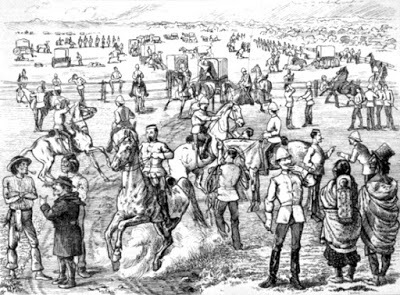 Mounties leaving Ft. Dufferin, 1874.
Mounties leaving Ft. Dufferin, 1874.The piece of evidence on which historians like Hewitt can hang their case is the pass system that was imposed by federal bureaucrats, especially after the North West Rebellion, forcing Indians to stay on their reserves for fear of mayhem. This was in violation of treaty and of existing Canadian law. But it was hardly the reason for the existence of the force. A larger force might have removed the need for it; but the government was not prepared to make the expenditure. And it was perhaps understandable in the historical circumstances. Rather like the War Measures Act.
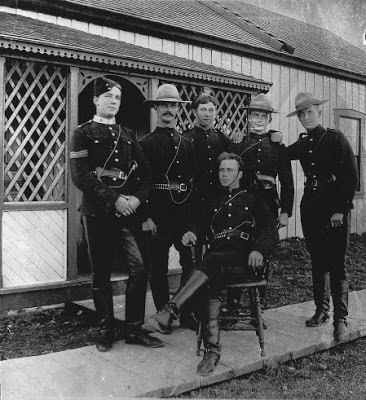 New uniform, 1900.
New uniform, 1900.Hewitt offers another bit of evidence: the fact that Sir John A Macdonald openly based his concept of the NWMP on the model of the Royal Irish Constabulary. Supposedly, the RIC was “a paramilitary police force created by the British to keep the Irish under control.” So, by association, the Mounties were there to rough up the Indians.
Something should immediately smell fishy here. The Macdonald government relied heavily on Irish Catholic support, with prominent Tory Irish Canadian leaders like D’Arcy McGee and Nicholas Flood Davin. If the RIC were generally seen at the time as an instrument of oppression of the Irish, Macdonald wound never have dared point to them as his model.
No, the RIC was the model because it was an armed force, as the Mounties were intended to be, and because it was considered the best police force in the world at the time.
The RIC was then recruited locally, and was 75% to 80% Catholic. The pay was low: the government found they could count on constables being supported by local donations of food. In other words, it was generally supported by the local populace.
They of course enforced the existing laws, and the laws themselves were discriminatory. But that was not their business. There is something to be said for maintaining social order and preventing thefts and murders, after all.
Some Irish nationalist groups like the Ribbonmen and White Boys were always in conflict with them. But then, so were the Orangemen. The RIC was probably seen by most as politically neutral.
In the 20th century, the reputation of the RIC went downhill fast, as it was packed with English recruits and indeed used to ruthlessly impose foreign government control. This was the era of the “black and tans.” But it is a distortion to project this backwards.
Since Irish independence, there has been a lot of revisionist history in Ireland. One Irish friend of mine, product of the local schools, was shocked to hear me point out that, at the time, the Easter Rebellion was not supported by the majority of the Irish population. Another Irish friend was shocked to be told that the colours of the Irish flag was green, white, and orange. He had apparently always been taught that they were green, white, and gold. And he was yet more shocked to be told the orange was indeed there to represent the Protestant Irish.
We do not need the same sort of politicized, falsified history in Canada.
Especially we Irish-Canadians. Our ancestors came here in good part to escape that sort of thing.
My proudly Canadian Irish grandmother, for example, explained that she would never read a history of Ireland written by an Irishman. Because she assumed he would not be neutral.
'Od's Blog: Catholic and Clear Grit comments on the passing parade.
Published on January 02, 2020 07:33
Harry and Meghan in Canada, Eh?
 The Duke and Duchess
The Duke and DuchessPrince Harry and Meghan Markle are spending Christmas and New Years in Canada. This is a little surprising—not with the rest of the Royal Family at Sandringham.
And the matter seems to have been publicized, too.
This is not a matter of dividing time between the grandparents; Markle’s family is American. Meghan, of course, having lived in Toronto, has Canadian friends. But they are likely to be engaged with their own families. And the couple are not spending the holidays in Toronto.
I suspect this is a trial run for the idea of Harry and Meghan relocating permanently to Canada, to avoid butting heads with the senior royal couple, William and Catherine.
As it happens, Julie Payette, the current Governor-General, is not flourishing in the role. She is notably absent from many public functions.
This offers an opportunity for royals like Harry and Meghan to pick up the slack, if they are in-country anyway. And perhaps then, having established their role, once Payette has served her term, or perhaps resigned, to take over the post officially. With a member of the royal family already on site, it will seem odd to appoint someone else to the role.
In the old days, this might all have been managed from London. But nowadays, it is likely to take a bit of campaigning. Meghan already has Canadian connections. Perhaps if they play this up, and do some hand pumping…
Personally, as an out-of-the-closet royalist, I hope it happens. I am not particularly attached to the Windsors as incumbents, but I think monarchy works well as a way of giving a nation unity--especially a multi-ethnic nation.
There is something to be said for having a Canadian, and not a foreigner, as Governor-General, for the sake of Canadian independence. But the same argument would hold for Canada establishing its own independent royal line.
'Od's Blog: Catholic and Clear Grit comments on the passing parade.
Published on January 02, 2020 05:35
January 1, 2020
Mary Had a Little Baby
'Od's Blog: Catholic and Clear Grit comments on the passing parade.
Published on January 01, 2020 14:18
December 31, 2019
A Beautiful Rebel Christmas Song
often overlooked.
'Od's Blog: Catholic and Clear Grit comments on the passing parade.
Published on December 31, 2019 08:47
Born with a Gift of Laughter, and a Sense that the World Was Mad
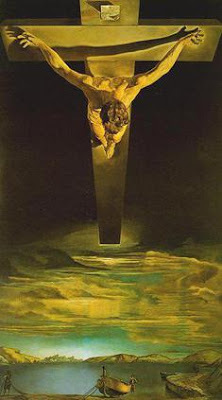
Friend Cyrus opines that morality is derived from the practical needs of society. More generally, “cultural relativism” has become a common position: morality is what your society says it is.
This goes against one of the most vital of all insights: that the world is mad.
So says Christianity: God came to the world, and the world crucified him.
Not just the civil authorities, either. The religious authorities were very much in on the act. And not just the authorities, either. They judgment is ultimately confirmed by the mob, by democratic vote.
Seems pretty definitive: whatever society as a whole is pushing, it is not reliable. You can’t derive morality from social authority.
This is also a possible understanding of Jesus’s warning “Enter through the narrow gate. For wide is the gate and broad is the road that leads to destruction, and many enter through it. But small is the gate and narrow the road that leads to life, and only a few find it.”
A pessimistic reading is that very few get to heaven. A more optimistic reading is that we only get to heaven one by one, never by following the crowd.
In the Gospel of John, Jesus says of his disciples—that is, of Christians—“I have given them your word and the world has hated them, for they are not of the world any more than I am of the world…. They are not of the world, even as I am not of it.”
Christians are to be in the world, but not of it.
What about the Church? Isn’t it a social authority?
Yes, it is—and have we not seen ourselves, even in very recent days, that as a social authority it is not reliable? What is reliable is the “deposit of faith,” the scriptures and time-tested traditions it preserves, and must exist to preserve. But not the USCCB or CCCB, meeting as a group—and not the Vatican.
The common phrase “whenever two or more of you are gathered in my name, I am with you,” often used to describe the Church, is a misquotation. Jesus actually said, “whenever two or three of you.” This suggests an upper limit as well as a lower one for his true presence.
There must have been a reason why, of his many disciples, he chose only twelve to be apostles, to whom he delegated authority. Only twelve to join him in the Upper Room. The apostles themselves understood this number as significant, for when Judas apostasized, they chose one successor.
Twelve seems a reasonable upper limit at which all members of the group will know one another and interact with one another as individuals. It is the upper limit of human sanity.
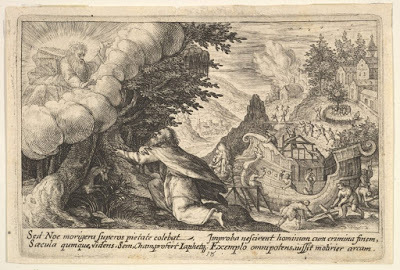 Noah
NoahThe same insight, that the world is mad, or is no moral guide, is found in Judaism, only a little less centrally. It is the story of Noah, of Lot—only the individual, only one man, is righteous. It is the story of the prophets, almost invariably, as Jesus notes, persecuted by their society. It is the story of the Jews as a whole, in the diaspora.
It is also clear enough in Buddhism—Sakyamuni literally rejects “the world”—he was fated to be a world ruler. He abandons his city and his palaces, then even his few companions in the forest, to achieve his enlightenment in solitude.
To me, the most worrisome thing about Islam is the absence from its mainstream of this awareness that the world is mad.
The Sufis understand it.
Beyond our great religious traditions, the insanity of the social plane is also the core insight of much of our greatest literature. In the Odyssey, Odysseus is always struggling with an irresponsible crew. In the Iliad: nobody listens to Cassandra or to Laocoon. And Troy falls not by force of massed arms, but through the cleverness of an individual, Odysseus. In the entire Medieval “knight errant” tradition; like the cowboy tradition that followed it. In Don Quixote—superficially Quixote is mad, and those around him are sane. Yet we sympathize with him, and see them all as dullards by comparison. Erasmus’s In Praise of Folly. Burton’s Anatomy of Melancholy. Gulliver’s Travels. Kafka’s entire corpus; Lord of the Flies; Catch-22; To Kill a Mockingbird; One Flew over the Cuckoo’s Nest. Hans Christian Andersen’s "The Emperor’s New Clothes.” “High Noon.” Orwell’s 1984.
It is a convenient error to understand 1984 as solely a prediction of the future. “1984” is “1948” transposed, the date the book was written, for a reason. Orwell meant that, if looked at carefully, the situation in England in 1948 was already that described.
Is there any similar literary or philosophical argument for communitarianism?
There is. It is called fascism.
'Od's Blog: Catholic and Clear Grit comments on the passing parade.
Published on December 31, 2019 08:43



